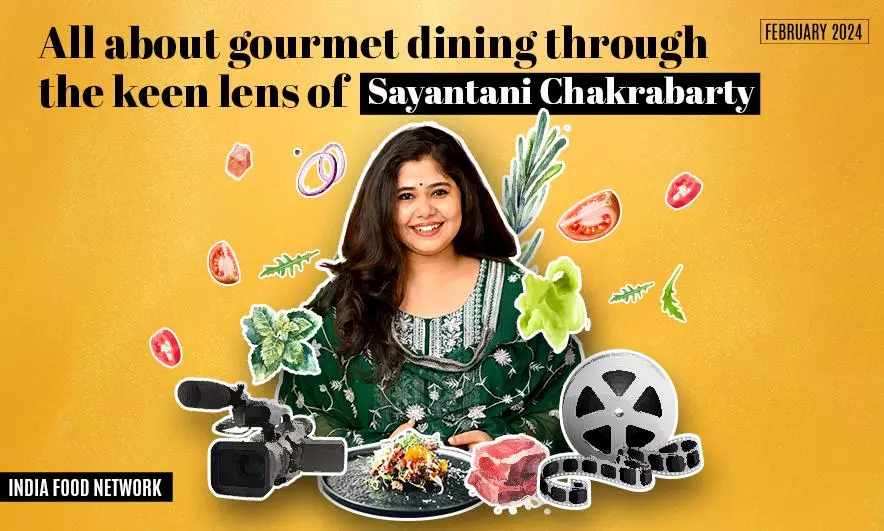Decoding India's gastronomic gems and redefining fine-dining excellence on the global stage with God’s of Gourmet
Join us in our conversation with Sayantani Chakrabarty, as we delve into all things opulent, gourmet and Indian
- By Natasha KitturLoading...
- | 4 Feb 2024 10:07 AM IST
 X
X
While India is hailed as the mecca of street food, serving our diverse and distinct population a variety of offerings all the way from chaats to frankies and shawarmas, a lot of Indian cuisine still remains shrouded in mystery. And while this mystery leaves room for a lot of exploration and experimentation, it wouldn’t be incorrect to conclude that a lot of restaurants and eateries are tapping into this vast potential in order to put Indian cuisine on the global map. And it is at this crossroads, where we step into a realm where culinary artistry meets storytelling, and fine dining transcends the boundaries of mere opulence.
Gods of Gourmet, an immersive OTT docu-series, unravels the truth behind some of India's most celebrated fine dining establishments. Our exclusive interview with Sayantani Chakrabarty, the creative director behind the series, provides a captivating insight into the journey of culinary excellence. Highlighting revered restaurants like Koishii at The St. Regis Mumbai and Riwaz at The Ritz-Carlton Bangalore, the series documents the culinary prowess of establishments across the country. To understand the nuances of a gastronomic odyssey that explores the untold stories, passion, and dedication that redefine the essence of fine dining in the Indian culinary landscape, one can simply log on to Disney+Hotstar to watch the series. And to immerse yourself in the behind-the-scenes happenings of God’s of Gourmet, scroll down to read our entire interview.
Edited excerpts from the interview
Starting from the basics, what inspired you to create a show like Gods of Gourmet?
I am a consumer of quality content; content that has a good story to tell, with big personalities, and has a big ‘oomph’ factor, and of course, cinematic majesty. Netflix’s Chef’s Table enamoured me a lot, so when I started ideating content for OTT, I also wanted to chronicle India’s glamorous and inspiring dining experience in a beautiful, authentic way. That’s how Gods of Gourmet happened.
Can you share any specific instances or initiatives where sustainability played a significant role in the culinary narratives?
Sustainability was actually the driving force behind the entire show. Every property and restaurant chosen are deeply committed to sourcing local ingredients and growing vegetables organically as much as possible. For instance, at Al Di La, Conrad Pune, chef Anirban highlighted the significance of sustainable farming practices, demonstrating a conscious effort to support local agriculture and reduce the ecological footprint. Chef Pankaj from Toya, at the Westin Himalayas, highlighted how they incorporate local Himalayan ingredients into their progressive Asian cuisine, creating a culinary experience that respects the environment. The Flying Elephant at Park Hyatt Chennai showed their commitment to sustainability through its farm-to-table philosophy, promoting the use of fresh, locally produced ingredients.
What were some eye-opening moments for you and the crew while capturing the behind-the-scenes aspects of these acclaimed restaurants?
What left us in awe was the regimented routine—a clockwork symphony if I might say so—as the kitchen transformed – before, during, and after operational hours. The meticulous preparation by the hotel staff unfolds in a very disciplined manner, leaving everything spic and span. They are like magical fairies, who just know how to make things perfect!
Were there any specific elements or philosophies of these restaurants that left a lasting impression on you?
The way each of the restaurants featured in Gods of Gourmet strive to be “vocal for local” is an exemplary factor for the whole nation. Besides, I am thoroughly impressed by how each of them, be it the Marriott brand, or Hyatt, or Conrad, have given their chefs a blank canvas to experiment with their personal food philosophy all the while maintaining customer satisfaction as the top priority. I believe this definitely deserves an applause!
Based on your experiences with the chefs and restaurants, what trends do you foresee shaping the future of fine-dining in India?
In the fine dining sphere, the once-dominant trend of fusion cuisine, including molecular gastronomy is gradually giving way to a more nuanced approach. Today, there is a discernible shift towards an appreciation for authenticity and a blend of tradition with modern culinary techniques.
I found such instances in restaurants like Tiamo at Conrad Bengaluru, where Mediterranean cuisine is celebrated for its simplicity, and Sarvatt at Hyatt Regency Ahmedabad, which seamlessly weaves local traditions into its culinary narrative. Even at Thai Soul, Grand Hyatt Kochi, Chef Goong cooks what her mother taught her. That’s how authentic she is. That’s the food story! These restaurants showcase a departure from the extravagant and experimental, a trend which is here to stay.
How do you think the success of these restaurants contributes to the broader cultural and culinary identity of India?
The stories of these restaurants extend beyond culinary excellence; it becomes an integral part of shaping India's cultural and gastronomic identity. For the first time, 'Gods of Gourmet' invites viewers to explore India beyond the familiar "street-food" narrative. Our mission transcends the stereotypical label, aiming to present India as a global fine-dining destination. While the richness of street food holds cultural significance, we emphasise that India's vast and diverse fine-dining landscape deserves equal recognition. Our mission was to showcase the grandeur and sophistication of India's culinary prowess, urging the world to acknowledge its expansive fine-dining domain.
Did you notice any unique approaches to engaging with diners beyond the culinary aspect?
Most of these restaurants have personalised chef interactions, and they all have different stories to tell through their food. Some have different culinary stations that pique the interest of guests differently. These elements enhance the overall dining experience beyond the culinary delights.
If you had to pick out a favourite dish from the ones showcased in the docu-series, which one would it be and why?
Okay, this is the hardest question so far! Every restaurant had their own showstopper. But one dish that stood out to me was Chef Goong’s (from Thai Soul, Grand Hyatt, Kochi) Papaya Salad. It’s her mother’s recipe, something she’s been cooking since she was six. It is made with so much love, nostalgia and purity that it feels like a burst of emotions, more than flavours, inside you. And oh, the taste! You’d feel like you’re in Thailand already.
With the immense success that God’s of Gourmet has seen, what projects can we expect from AIL India regarding the food and beverage sector in the future?
I don’t want to give away everything but you can hopefully expect something very soon. If it's on the cards, it will happen.

Natasha Kittur
Natasha Kittur is an aspiring writer. Her love for anything with cheese and spice is profound, but a white sauce pasta always tops her list. In her free time you will catch her reading or watching crime books and shows or go on and on about psychological experiments and theories. She aims to write a book in the fictional genre someday.


